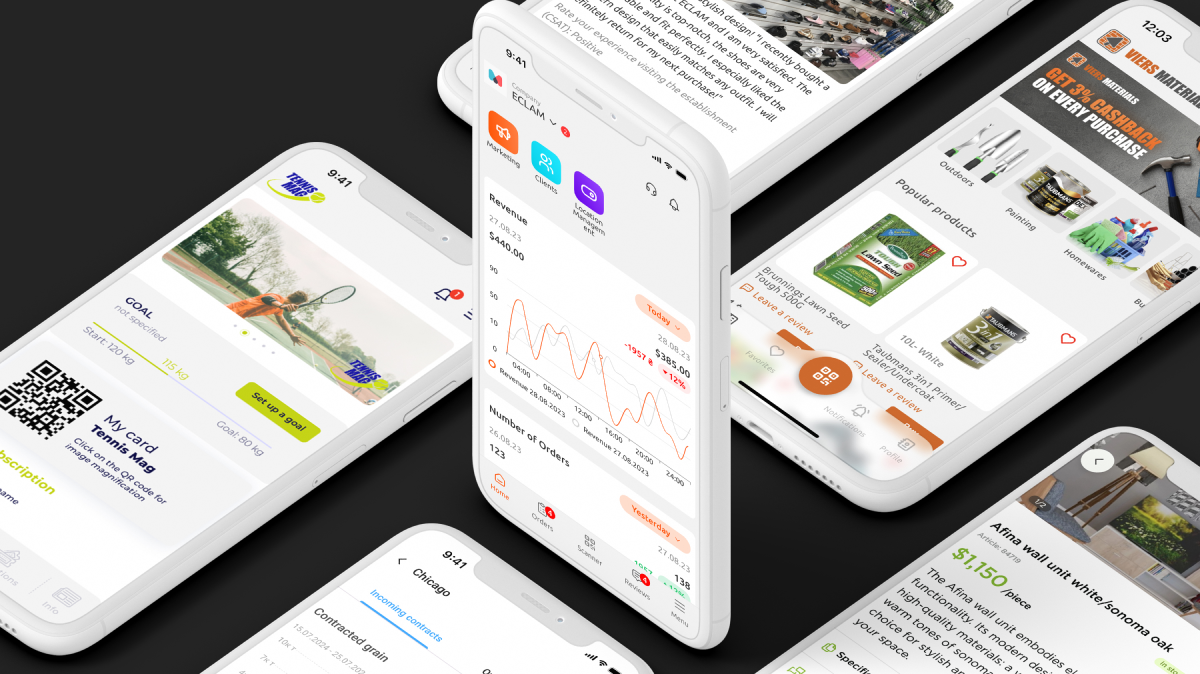
In the modern world, mobile apps are an integral part of any successful business strategy. However, developers and business owners often face an important question: should they choose a native or cross-platform app? In this article, we'll take a closer look at both options, their advantages and disadvantages, so you can make the best choice for your business.
What are native apps?
Native apps are programs created specifically for a particular operating system, such as iOS or Android. They are developed using platform-specific programming languages, such as Swift for iOS and Kotlin/Java for Android.
Advantages of native apps:
- High performance. Native applications work directly with the device hardware, which ensures speed and stability.
- Smooth user experience (UX/UI). The interface meets the platform standards as much as possible, making the application intuitive for users.
- Access to device functions. Native apps have full access to functionality such as camera, GPS, biometric data, etc.
Disadvantages of native apps:
- High development cost. You need to create separate versions for iOS and Android, which significantly increases costs.
- Long development time. Parallel development for different platforms takes more time.
What are cross-platform applications?
Cross-platform applications are created to run on multiple operating systems simultaneously using a single code base. The most popular cross-platform development tools are React Native, Flutter, and Xamarin.
Advantages of cross-platform applications:
- Fast development. One codebase for both platforms significantly reduces the time of application development.
- Cost savings. Fewer resources for development can reduce costs.
- Wider coverage. One application works on several platforms, which increases the audience.
Disadvantages of cross-platform applications:
- Limited performance. There may be delays due to code interpretation.
- Limited access to device functions. Not all tools support the latest iOS and Android features.
- Problems with UX/UI. A unified approach may not meet the standards of a particular platform.
Key factors in choosing between native and cross-platform approaches
1. Budget.
If your budget is limited, a cross-platform approach can be a cost-effective solution. However, if your business has the resources to invest, native apps will provide better quality.
2. Development time
When you need a quick launch, cross-platform development can save time. But if quality is more important, it's better to choose a native approach.
3. Target audience
If your audience mainly uses one platform (for example, Android only), it makes sense to create a native app. If you need to cover both platforms, then a cross-platform solution is more rational.
4. Application functionality
For complex applications with high performance requirements (for example, games), it is better to choose a native approach. If the application is simple (e.g., an online store), cross-platform can handle the task.
Popular technologies for development
Native technologies:
- iOS: Swift, Objective-C
- Android: Kotlin, Java
Cross-platform technologies:
- React Native. Provides fast development and a wide range of features.
- Flutter. It is suitable for creating interfaces with complex animations.
- Xamarin. Integrates with the Microsoft ecosystem.
When should I choose a native approach?
- For programs that require high performance (games, AR/VR applications).
- When deep integration with the platform is important.
- If your budget and time allow you to implement separate versions for iOS and Android.
When is it better to choose a cross-platform approach?
- If you need to quickly launch an MVP (minimum viable product).
- If you have a limited budget.
- When you plan to develop an application for both platforms with basic functionality.
Tips for business
- Analyze the goals of your project. Understand which features are critical.
- Estimate the budget and time. Determine how many resources you are willing to invest in development.
- Consult with experts. A professional opinion will help you avoid mistakes and choose the best approach.
When choosing between a native and cross-platform application, it is important to consider your business goals, budget, and functionality requirements. Both approaches have their strengths and weaknesses. Native applications provide maximum performance and quality, but require more resources. Cross-platform solutions save time and money, but may have limited functionality.
The right choice will help you create an effective tool for attracting customers and growing your business.



